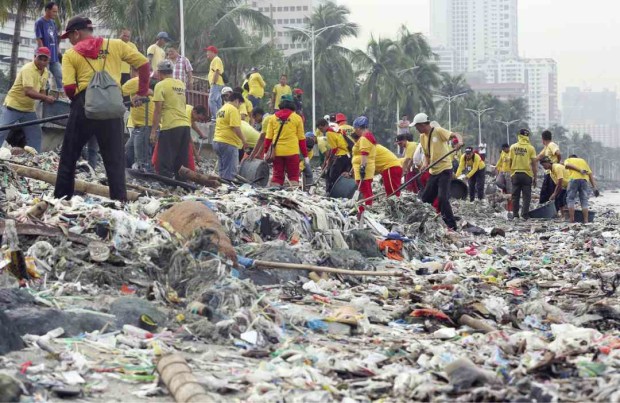
The MMDA does not want its clean-up efforts to go to waste, which is why it wants to hold local leaders accountable.—MARIANNE BERMUDEZ
After filing administrative cases against several barangay chairs who failed to keep their areas free of illegally parked cars and other obstructions, the Metropolitan Manila Development Authority (MMDA) is now training its eyes on those who were unable to ban the throwing of trash in waterways that had already been cleaned up by the agency.
Lawyer Victor Nuñez, MMDA liaison officer for government agencies, said that at least four barangay chairs may be charged with neglect of duty in the Office of the Ombudsman next week for their failure to maintain the cleanliness of the creeks in their areas which were under the agency’s Estero Blitz program. Nuñez, however, declined to say which cities the errant barangay chairs were from.
In the past two months, the MMDA has filed administrative cases against seven barangay chairs who did not do their part in keeping their areas clear of obstructions and illegally parked vehicles.
Those charged were Quezon City barangay chairs Jesus Lipnica Jr. (Pinyahan), Teodoro Calaunan Sr. (West Crame), Telesforo Mortega (San Roque District III), Antonio Benito Calma Jr. (Don Manuel), Clarito de Jesus (Veterans Village) and Elmer Maturan (Bagumbayan), and Parañaque City barangay chair Philip Factor (Don Galo).
Nuñez said they were still collecting documents, evidence and other surveillance reports to strengthen their case against the barangay officials concerned.
He added that through this move, the MMDA hoped to impress upon other local officers that it was serious in holding them accountable for maintaining order and discipline in the areas under their jurisdiction.
The MMDA regularly conducts a summertime cleanup of Metro Manila’s 273 esteros to not only eliminate breeding areas of disease-carrying mosquitoes, but also to prevent garbage from clogging pumping stations which often cause flooding during the rainy season.


